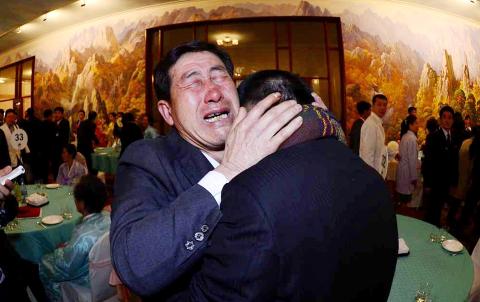More than 100 South Koreans, many of them in wheelchairs, crossed the world’s most heavily fortified border yesterday to be reunited with family members living in the North whom they have not seen since the Korean War.
The reunions were held after the North set aside a demand for the suspension of joint military drills by the South and the US, which it had demanded as a pre-condition.
At the Mount Kumgang resort just north of the border, long-lost relatives embraced with tears, joy and disbelief. Some failed to recognize family they have not seen in more than six decades.

Photo: Reuters
Among the South Koreans was Jang Choon, an 81-year-old in a wheelchair who was dressed in the light brown suit and maroon tie he had bought for the reunion with a brother and a sister living in the North.
“My youngest brother Ha-choon had not even started school when I last saw him,” said Jang, the eldest of four siblings, one of whom has died. “But now he’s an old man like me.”
The six days of family reunions take place under the cloud of a UN report on human rights abuses in North Korea, which investigators have said were comparable to Nazi-era atrocities. They have said North Korean security chiefs and possibly even leader Kim Jong-un himself should face international justice.
Pyongyang has rejected the report, describing it as a concoction by the US and its allies.
However, the North appears to be willing to maintain a rapprochement with South Korea that may be crucial as it seeks food for its people.
The possibility of looming food shortages could have been a factor.
“Now it’s almost March, when the new farming season must begin, and Kim Jong-un has no means to feed his people,” said Kim Seok-hyang, professor of North Korean studies at Ewha Womans University.
“He must get outside help. But looking around, the US won’t give him anything, China doesn’t seem willing to give anything and then there’s the UN human rights report pressuring him. The family reunions card is his last resort because he can’t neglect his people,” the professor said.
The reunions used to be held almost annually, but have not taken place since 2010 as tensions between the two Koreas spiraled after the South said the North sank one of its naval vessels. In later months, the North shelled a South Korean island and Pyongyang threatened nuclear attacks last year.
For many of those making the trip to Mount Kumgang, it will be the last chance to meet separated loved ones.
Of the 128,000 people registered in South Korea as coming from families that were torn apart by the war, 44 percent have already died and more than 80 percent of survivors are over 70, according to South Korea’s Unification Ministry, which handles inter-Korean relations.
There have been 18 family reunions since the first in 1985 and a total of 18,143 brothers, sisters, fathers and mothers have met.
The events have never been regular and the two Koreas have squabbled over the details of the events, like deciding on the venue. After the first four, in which families traveled back and forth between Seoul and Pyongyang, North Korea has insisted on hosting the events on its soil.

A Chinese aircraft carrier group entered Japan’s economic waters over the weekend, before exiting to conduct drills involving fighter jets, the Japanese Ministry of Defense said yesterday. The Liaoning aircraft carrier, two missile destroyers and one fast combat supply ship sailed about 300km southwest of Japan’s easternmost island of Minamitori on Saturday, a ministry statement said. It was the first time a Chinese aircraft carrier had entered that part of Japan’s exclusive economic zone (EEZ), a ministry spokesman said. “We think the Chinese military is trying to improve its operational capability and ability to conduct operations in distant areas,” the spokesman said. China’s growing

Taiwan yesterday denied Chinese allegations that its military was behind a cyberattack on a technology company in Guangzhou, after city authorities issued warrants for 20 suspects. The Guangzhou Municipal Public Security Bureau earlier yesterday issued warrants for 20 people it identified as members of the Information, Communications and Electronic Force Command (ICEFCOM). The bureau alleged they were behind a May 20 cyberattack targeting the backend system of a self-service facility at the company. “ICEFCOM, under Taiwan’s ruling Democratic Progressive Party, directed the illegal attack,” the warrant says. The bureau placed a bounty of 10,000 yuan (US$1,392) on each of the 20 people named in

Nine retired generals from Taiwan, Japan and the US have been invited to participate in a tabletop exercise hosted by the Taipei School of Economics and Political Science Foundation tomorrow and Wednesday that simulates a potential Chinese invasion of Taiwan in 2030, the foundation said yesterday. The five retired Taiwanese generals would include retired admiral Lee Hsi-min (李喜明), joined by retired US Navy admiral Michael Mullen and former chief of staff of the Japan Self-Defense Forces general Shigeru Iwasaki, it said. The simulation aims to offer strategic insights into regional security and peace in the Taiwan Strait, it added. Foundation chair Huang Huang-hsiung

PUBLIC WARNING: The two students had been tricked into going to Hong Kong for a ‘high-paying’ job, which sent them to a scam center in Cambodia Police warned the public not to trust job advertisements touting high pay abroad following the return of two college students over the weekend who had been trafficked and forced to work at a cyberscam center in Cambodia. The two victims, surnamed Lee (李), 18, and Lin (林), 19, were interviewed by police after landing in Taiwan on Saturday. Taichung’s Chingshui Police Precinct said in a statement yesterday that the two students are good friends, and Lin had suspended her studies after seeing the ad promising good pay to work in Hong Kong. Lee’s grandfather on Thursday reported to police that Lee had sent